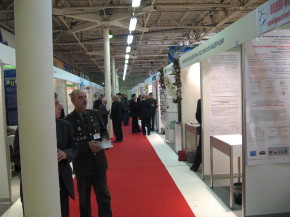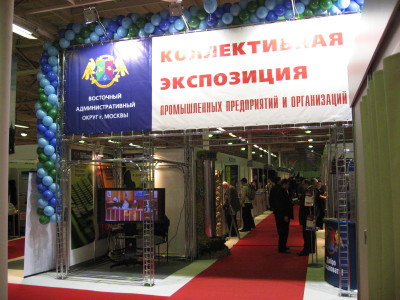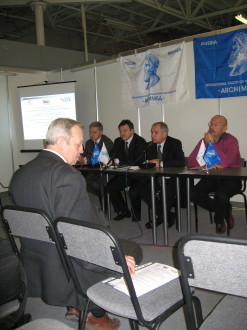Eureka, I've Found it! Now what?
Arkhimed, Moscow's annual international salon for inventors, was held this March. Before the collapse of the Soviet Union, many of the participants would have needed permission to meet foreigners. Now they freely rubbed elbows with the public and hawked the results of their recent research.

The Ministry of Defense's Central Scientific Research Institute #33 was there. It listed work by Major-General N.I. Alimov, among others. Alimov headed Military Department 61469 in the formerly secret city of Vol'sk-18, where the Soviet Union conducted major chemical weapons research and production. Alimov's next-door neighbor in Saratov-37, another formerly secret city, the Military Institute for Radiation, Chemical and Biological Protection was also there. Chemical detection methods, protective gear and weapons disposal techniques make these institutes' research especially useful in today's terrorist-plagued world.
I counted over 100 principal exhibitors and many smaller ones. While scientists and engineers from Russia's military predominated, others came from universities, the Russian Academy of Sciences, and private enterprise.
The salon reflected Russia's continuing problems in broadening its economic success beyond selling energy and raw materials. It's not a new problem for Russia. The Soviet Union never solved it. Now President Putin's team is having a go at it. In his February 1st press conference, President Putin called the limited growth of Russian industrial manufacturing "a very important problem. Very important." He suggested that dealing with the problem while export earnings were high was also crucial.
The Soviet Union created a highly educated class of scientists and engineers, many of whom directly or indirectly worked for the military. For the past 15 years the Russian leadership has tried to link this class' scientific and technical knowledge to its nascent market economy. For starters, it dramatically relaxed its secrecy. How could you tap into your scientists' abilities if they couldn't talk publicly about their work and share ideas with each other?

Russian industry's problems went beyond a scientific fix, however. It needed a healthy business climate, a business culture, stable laws, investors and more. That's coming, but slowly. With no domestic industry demanding their creativity, many of Russia's scientists and engineers find themselves marginalized. "Eureka, I've found it!â Now what?" seems to express their plight.
That situation seemed quite evident at the salon. According to the patent dates on many of the exhibits, Russians technicians are still working hard in their laboratories. But they're stuck in what economists call technology push – creating new technologies and having to convince the world they're needed. That's a hard sell, even in developed market economies. It wasn't clear how many exhibitors were successfully making that pitch.
Much of Russian industry still considers innovation a luxury and overall Russian industry spends less than one percent of its innovation budget on market research. 1 That points to what economists call a lack of technology pull, or demand coming directly from industry.
A number of small, innovative firms were among the exhibitors, pointing to some success stories. MAK-DEL Technologies, founded in the early 1990s, produces medical lasers for ophthalmology therapy. Others offered a wide variety of services and products such as software design, water purifiers, and construction materials.
At a salon round table, participants discussed Russia's problems in finding financing to help link its science sector to its economy. The discussants included A.I. Kashirin, the head of a Russian business-angel association; V.K. Yegorov, an official from The Foundation for Assistance to Small Innovative Enterprises; M.V. Shekhovtsov, director of the Moscow Venture Fund ; B.A. Dyshko, a successful entrepreneur from "Sport Technologies"; and S.V. Lobkovskiy, a manager for company relations with the St. Petersburg Venture Fair. Ye.A. Baranov of the Russian Chamber of Commerce directed the discussions.

A decade ago, there were no venture capital funds or serious financial support sources for small innovative Russian companies. Progress is clear. Still the discussions pointed to a number of obstacles, not the least of which is attracting private investments when alternative opportunites such as real estate and food and beverages are so hot. Several people also referred to unsettled legal issues: patent rights related to inventions that received state funding and the costs of securing those rights. Still, the upbeat remarks made by a successful entrepreneur who is producing high-tech sports training equipment strengthened the round table's overall positive note.
Russia's inventors have shown a dogged persistence throughout the economic reforms. That trait should serve them well if they're able to get continued improvements in the business climate and better financing.
2 April 2007
Home